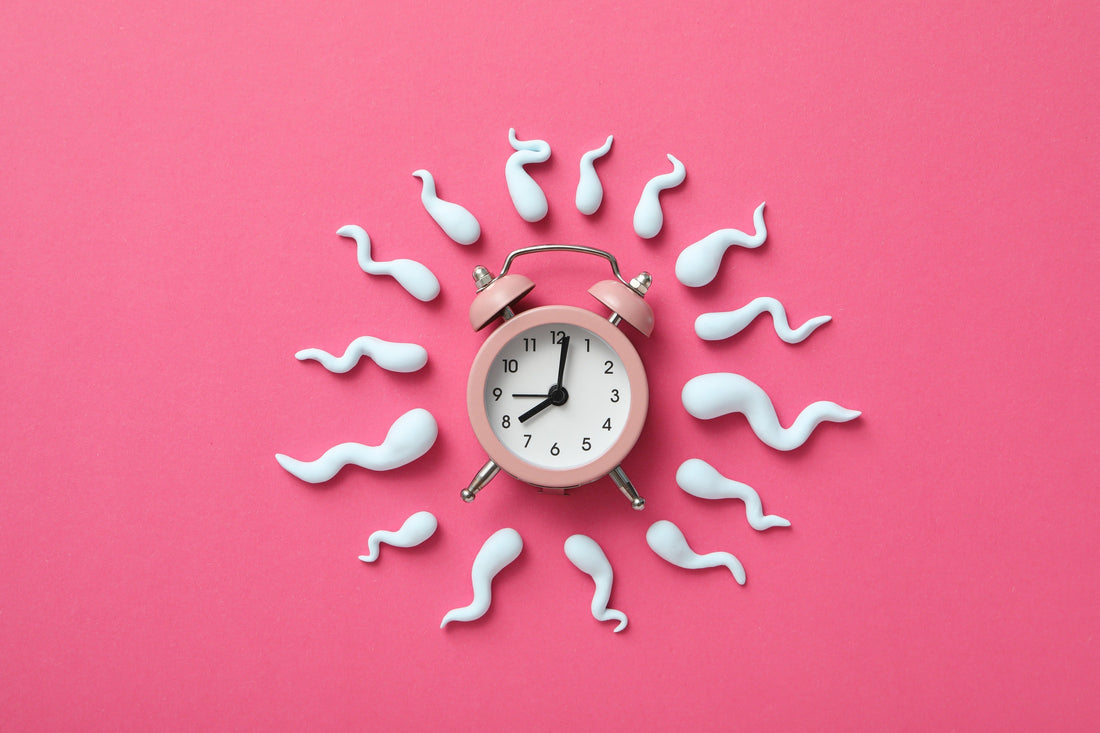It takes about two to three months to improve sperm quality, as the sperm production process takes around 70 days. However, significant improvements may take longer, depending on the underlying factors affecting sperm quality. In this article, we’ll go over the sperm production process, why it takes this long to improve sperm quality, and what you can do to optimize your sperm health as you try to conceive.
The sperm production process
Sperm take about two and a half months to develop and mature. This process is called spermatogenesis. This means that falling ill or taking medication today can impact the sperm you ejaculate in three months. At the same time, any positive changes you make today will start influencing your sperm in around three months.
The timeline can extend to six months or longer depending on personal factors like age, health status, and how strict you are with positive lifestyle changes. The right lifestyle changes and medical interventions (if needed) can get you on the right track.
Factors that affect sperm quality
Several factors can influence sperm quality, including lifestyle choices, diet, stress levels, medical conditions, and environmental exposures. Taking stock of these factors in your life can help boost fertility naturally:
- A diet rich in antioxidants, vitamins and essential nutrients can work wonders on your sperm health.
- Maintaining a healthy weight can significantly improve sperm parameters. Regular, moderate exercise is the way to go for optimal sperm numbers. Exercising excessively can negatively affect sperm production.
- Habits like drinking, smoking, and recreational drugs do a number on testosterone levels, sperm count, and sperm production, so best to steer away.
- Stress management techniques, such as meditation, and getting adequate sleep can improve sperm health over time. Chronic stress increases cortisol which in turn impacts testosterone production. Sleep deprivation increases anti-sperm antibody production.
- Avoiding excessive heat around the testicles can help improve sperm counts. This means avoiding tight underwear, and not using laptops directly on your lap.
Since sperm production takes around two to three months, most men can expect to see improvements in sperm quality within 90 days after implementing positive lifestyle changes. However, if there are underlying medical conditions impacting sperm quality (such as varicocele, an infection, or hormonal imbalances), it may take longer or require medical intervention.
How to track sperm quality
Using an at-home sperm test kit like the Yo Home Sperm Test allows you to monitor key sperm parameters in the comfort of your own home. Regular testing can help you track improvements and make necessary adjustments to your lifestyle. If you’re worried about your results, the test records a video which you can share with your healthcare provider.
When to seek medical advice
You’ve made the lifestyle changes, feel great, but still struggle with low sperm quality. If this is you, it’s a good idea to consult a fertility specialist. A semen analysis can provide a detailed assessment and allows your fertility specialist to recommend the best next steps for your case.
Key Takeaway
Improving sperm quality often requires lifestyle changes which take time and commitment – but it’s entirely possible with the right approach. By weeding out unfavorable lifestyle habits, eating well, reducing stress, and avoiding harmful substances, you can improve your sperm. Small changes daily can make a difference in the long run and get you closer to your parenthood goals.

